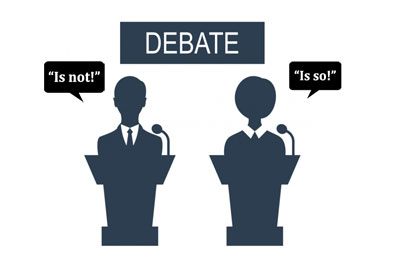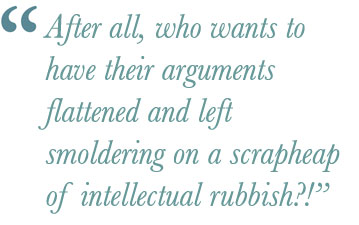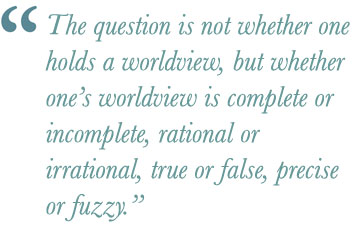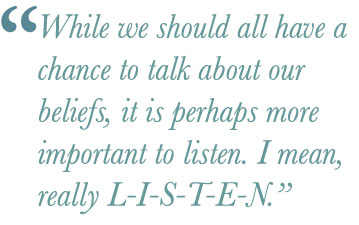By David P. Diaz, Ed.D.
Our Predisposition to Debate

Why do humans so enjoy vigorous debate? No matter what the theme, it seems we all relish the intensity and rigor of passionate argumentation. Indeed, the goal is to leave our opponents’ arguments smoldering on a scrap heap of intellectual rubbish. But to what end? I prefer to believe that my opponents have the best intentions. I’d like to think my opponents in debate seek after truth. And so, I want to debate them in earnest and with respect. But it doesn’t always end that way.
It seems that all debates, whether on the topic of politics, religion, philosophy, or science, should be approached with a smidgen of agnosticism.1 After all, none of us possess all knowledge. Indeed, we are finite beings and, therefore, possess limited knowledge. For us, the world remains an open universe of discourse. Thus, it’s no good to merely pronounce our beliefs as the “right ones” and consider the job done.

To debate anyone about anything, one must possess more than a bit of knowledge about the topic at hand. Gaining an accurate understanding of both sides of an issue will require much study, patience, questioning, and even doubt. Eventually, if we are lucky, we may gain some true beliefs about the realities of our world. But even then, we must maintain a measure of humility. Why? Because somewhere outside our limited knowledge may lie a defeater of our beliefs.2 A defeater could take the form of an argument—or series of arguments—that contradicts our own beliefs and ends up squashing our intellectual foundations. And so, we must continually reassess our own views. After all, who wants to have their arguments flattened and left smoldering on a scrap heap of intellectual rubbish?!
Worldviews: Everybody Has One
Our worldview3 consists of a set of propositions (i.e., the meanings of certain declarative statements) that we believe to be true about the world. For example, a Christian theist might hold the following beliefs: “God exists,” “Humans have free will,” “Miracles can and do happen,” and “The soul exists apart from the brain.” These beliefs are a part of their theistic worldview.

According to Geisler and Watkins, there are at least seven dominant worldviews, which include: Theism, Atheism, Pantheism, Panentheism, Polytheism, Deism, and Finite Godism.4 We may not know how to identify our worldview. Indeed, some may have never even considered the topic. Nevertheless, the question is not whether one holds a worldview but whether one’s worldview is complete or incomplete, rational or irrational, true or false, precise or fuzzy. Therefore, it seems like a good idea to decide which worldview best represents our own views and then determine its strength by examining its assumptions.
As people consider their worldviews, they encounter many difficult questions: Is our universe solely natural, or does it also include a supernatural realm? Are the brain and the mind the same or different? Do humans possess free will or are their actions determined? Do humans possess an authentic, objective purpose, or are we purposeless and insignificant in the universe? These questions, and many more, will likely be confronted when one deeply considers the answers to life’s most profound questions.
And, since many people rely heavily on science, it also helps to consider the following question: What are the assumptions built into scientific methodology? Science is not a worldview, it is a methodology that can be shared by all worldviews. Nevertheless, it helps to understand the limitations of science, lest one succumb to the naïve belief that science holds the answers to all questions.5
Tips for Debate
When one enters into a debate, it helps to understand what one believes about all of the above issues so that each person can distinguish between what he knows and what he merely thinks he knows. Discussing and listening to opposing positions doesn’t mean one needs to capitulate to those beliefs. On the contrary, learning about other points of view helps us better understand our own views and is perfectly compatible with continuing to believe what we want. However, besides helping us clarify our doubts and questions, engaging in debate may also persuade us to reassess our beliefs. Changing our minds in the light of better or more complete information is a good thing—no rational being should fear the truth.

My motto for every debate is always the same: “Seek the truth!” I want to listen carefully to another’s point of view and ask questions to make sure I understand the position. If I object to an opposing view, I want to say why I contest it and do so respectfully.
Unfortunately, I am guilty of losing my patience on occasion. I will lie awake at night pondering how I could have responded better or more graciously. In the end, none of us are right in everything that we believe, and, therefore, when we reach an impasse, we should, at least, agree to disagree agreeably.
The Burden of Proof
In formal debate, one carries a burden of proof in defending a proposition, for example, “Capital punishment is morally justified.” But in informal debate, for all legitimately debatable propositions, the claimant is under rational norms to bear the burden of proof when asked to do so. In other words, anyone who makes a truth claim must defend that claim when such a defense is requested. Like anyone else, debaters like to give their opinions and, in doing so, almost always make some kind of truth claim. But when they do, they are under a rational obligation to defend their claims. If they want to simply say, “I don’t believe in capital punishment” and leave it at that, then they are certainly entitled to their own personal opinions, but without any compelling reasons to substantiate beliefs, they remain mere opinions. On the other hand, any time someone makes a claim or counterclaim about something that is true or false, they are expected to defend it, at least when the claim represents a point of contention.

When debating, our emotions and tempers should remain in check. It does no good to resort to name-calling. If tempers flare and opponents debase each other, the result can be ugly. As Stump and Kretzman have aptly noted: “no one worldview has managed to attract all the world’s arrogant and intolerable people.”6 All debate should be friendly and courteous; there is no need to make enemies in our quest for truth. Unfortunately, it is too often the case that we approach such conversations with righteous indignation that we are on the right side.
While we should all have a chance to talk about our beliefs, it is perhaps more important to listen. I mean, really L-I-S-T-E-N. How often do we claim to listen to someone when, in fact, we are thinking of nothing more than what we plan to say next? Do we hear what is said? Do we care about what has led others to their views? Do we ask questions in an attempt to truly understand?
The Spirit of Debate
When we debate, our singular focus should be engaging in caring conversation to find the truth. Perhaps instead of framing the interaction as a debate, we should consider it a dialogue, discussion, or conversation. In any case, we should make every effort to communicate our own beliefs and to understand the opinions and views of others in our search for the truth. The spirit of any debate should always center on truth. Moreover, admitting you agree with your opponent is not a weakness. Indeed, seeking common ground is beneficial. In the end, none of us will go to the grave with all our beliefs intact, so a spirit of caring and humility should prevail.
About the Author
David P. Diaz, Ed.D., is an independent researcher, retired college professor, and publisher of Things I Believe Project. His writings have ranged from peer-reviewed technical articles to his memoir, which won the 2006 American Book Award. Dr. Diaz holds a Bachelor’s and Master’s degree in Science from California Polytechnic State University, a Master’s of Arts in Philosophical Apologetics from Houston Christian University, and a Doctor of Education specializing in Computing and Information Technology from Nova Southeastern University. [back to top]
Footnotes
- For the purpose of this article, an agnostic is simply one who “does not know” for sure the truth of a given assertion and, therefore, may question it as if it’s mistaken.
- A defeater is a reason(s) that removes or weakens the justification of a belief. See Robert Koons, “Defeasible Reasoning”, The Stanford Encyclopedia of Philosophy (Winter 2017 Edition), Edward N. Zalta (ed.)
- For this article, a worldview is a philosophical framework from which we view reality and make sense of life and the world.
- See Norman L. Geisler and William D. Watkins, Worlds Apart: A Handbook on World Views (Eugene, OR: Wipf and Stock Publishers, 2003).
- For more information about the limitations and assumptions of science, see my article titled: Seeking Truth: The Limits of Science and the Role of Philosophy and Theology.
- Eleonore Stump and Norman Kretzmann, “Theologically Unfashionable Philosophy,” Faith and Philosophy, Volume 7, Issue 3 (July 1990): 329–39.